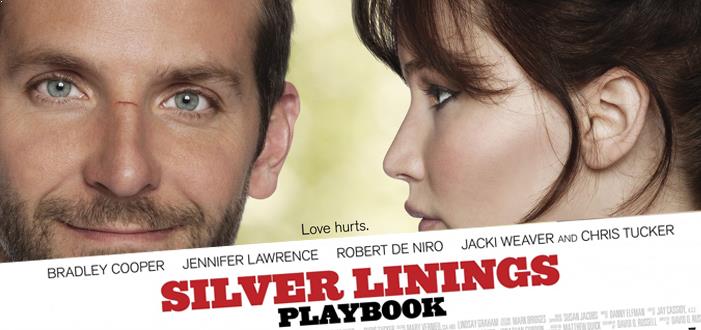
Silver Lining’s Playbook
What exactly is a mental disorder? Is it a personality or brain behavior that is abnormal, or unusual when measured against the typical, the ordinary, the mediocre, the average? Are those with such mentalities that differ from the mean disturbed or at least unnatural and therefore must be medicated? Clearly, as we can see in Silver Lining’s Playbook, the medication serves the purpose not to treat the weirdness of the persons, but to assimilate them into the functioning with normal people. Their personalities in other words are chemically steered toward becoming useful where they otherwise would not be.
The film, then, doesn’t examine the righteousness of whether someone who has handled their unique chemistry all their lives, and only lost control of that technique the moment an atrocious injustice was committed against him, with him being the protagonist. The morality of the society exhibited suggests that violent retribution of adultery is worse than being an adulterer. The will to retain justice, what can be referred to as vengeance or justified revenge, cannot be conducted vigilantly. Men submit to the rule of law, plausibly the social contract, so that justice can be retained. Meaning, there is recognition by men that there is a higher authority than what they judge as what justice is, and they submit to it. This natural phenomenal occurrence by the human species runs into friction at points on the surface of the shield of justice when it becomes corrupted.
And is it shone hear to be so? The film doesn’t care, or think it important to meditate on. Nor does it care to concentrate on the eccentric and the effort to conform to the ins and outs of daily life. Silver Lining’s Playbook migrates itself to a typical love triangle narrative, simply using novel puzzle pieces snapped together. And yet, is there a higher law at work here that we can see? Does the motioning of the consequences of an affair lead a man and a woman to find themselves in the highest possible places, which is love? Does God laugh at man’s plans because of mockery of the infantile, or because of his own satisfaction in gratifying His children with a greater sense of meaning, and therefore being, in His creation?
The adultery of course doesn’t just move the protagonist in the main. It makes perceptible a change, a shift, in who he is. But along with this shift is the reaction to all those around him and their lives. We can see the ripples of metamorphosis in each of the characters in response to this asteroid strike to one man’s life. The film simplistically observes every life improving, although that is never necessarily the case with change; the proper life adapts positively to change, but not everyone lives a proper life. Nevertheless, what we witness is the optimism woven intricately in the tablecloth of reality. That even through injustice, justice not only prevails, but is created.

